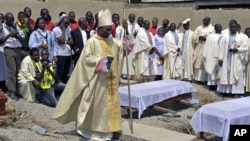A suicide bombing outside a church in the northern Nigerian town of Kaduna killed several people on Easter Sunday. Last week, authorities had ramped up security and said they uncovered various plots to disrupt festivities. No one has claimed responsibility for Sunday's bombing, though many suspect militant Islamist sect, Boko Haram, which is known to target Christians around holidays.
Security forces in northern Nigeria have stepped up security this Easter weekend. Extremist group Boko Haram is known for staging large attacks against Christians around holidays.
|
Attacks Claimed by Boko Haram |
|
Christmas Eve bombings in 2010 and Christmas day attacks in 2011 killed dozens.
Authorities said they raided two hideouts in northeastern Gombe state Thursday, seizing explosives and rocket launchers and arresting six people. Authorities did not say whether the suspects were from Boko Haram.
Security has been ramped up in the far northeastern city of Maiduguri, the epicenter of Boko Haram's attacks. On Friday, a helicopter patrolled the city from the sky and authorities searched private vehicles at checkpoints.
Boko Haram primarily targets government installations and security forces but has increasingly gone after civilians.
One woman in Maiduguri, who did not want to give her name, said the security concerns won't keep them from observing Easter.
"That can't stop me from going to church. I will still go to church but only that," she said. "I have to be vigilant. That's all. I will be careful of the places I go to and after church, I will just get back home."
Reverend Faye Pama said local Christians are celebrating this year in "a low mood."
"Of course you know the killings have been on and many lives have been lost. You know even the day before yesterday," he said. "There were the killings in the market. So, we are celebrating low-key."
He said "the security are all around the churches as usual, but the security people are more at alert."
Gunmen opened fire on Christian traders at a busy market in Maiduguri Wednesday, killing 11 people and wounding several others. Just before the attack, gunmen shot dead an electronics technician on a popular city street. No one has claimed responsibility for the attack, but authorities say they suspect Boko Haram.
Witnesses told VOA that nine of the dead were Christians from the Igbo ethnic group.
Borno state deputy governor Zanna Mustapha visited the market Thursday, which was closed to mourn the victims. A VOA reporter at the scene said the smell of blood still hung in the air.
The deputy governor said citizens need to cooperate with security forces. "There is nobody that will come down from the sky to help us. We must help ourselves," he said.
"People have to come out from their shells and give information so that we stop these things once and for all. The government is trying. The government is putting everything in place to make sure that this does not happen again," Mustapha added.
The government has tried offering cash rewards for information and sought to reassure citizens that cooperation would remain confidential. However, residents said they are scared of reprisal attacks.
Militants killed another 11 people during an attack at a Maiduguri market in February. Boko Haram later said it was exacting revenge on traders who had turned a suspected member of the group in to authorities.
Great Britain and the United States have issued warnings to their citizens living in Nigeria. The U.K. pointed to a "high risk of terrorist attack during religious festivals" this weekend.
Boko Haram wants to impose Islamic law in northern Nigeria. Experts said that the core Boko Haram cell has splintered into factions of varying extremism, some of which have professed ties to regional Al-Qaeda franchises.
Abdulkareem oleyeimi contributed reporting from maiduguri, nigeria.




